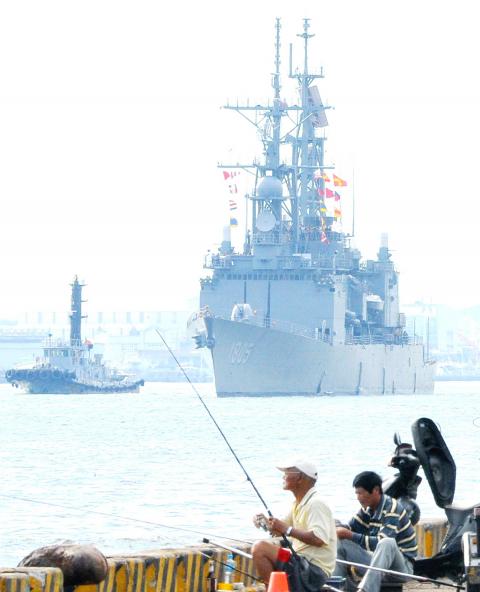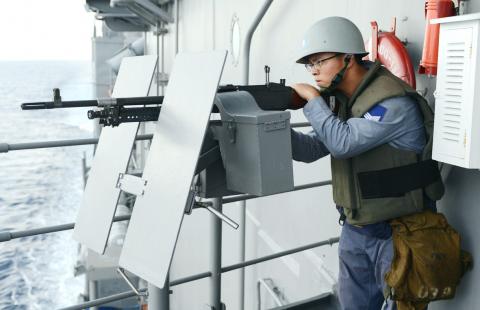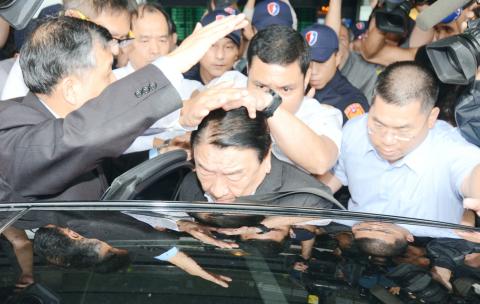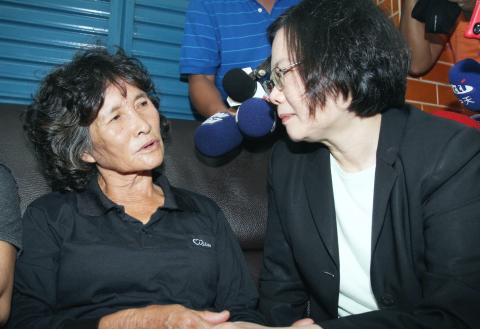The administration of President Ma Ying-jeou (馬英九) yesterday froze Philippine worker applications, recalled Taiwan’s representative to the Philippines and asked the Philippine representative to Taiwan to return to Manila amid a row over the killing of a Taiwanese fisherman.
The government launched eight retaliatory measures, including a travel alert on the Philippines, in retaliation for the fatal shooting on Thursday last week.
Premier Jiang Yi-huah (江宜樺), in a scheduled press conference at 6pm, announced the implementation of the eight retaliatory measures and said although the government approved of an apology issued by Philippine President Benigno Aquino III at about 4:30pm yesterday, it said the statement, which categorized the death of 65-year-old Hung Shih-cheng (洪石成) as an “unintended” accident, was unacceptable.

Photo: Huang Chih-yuan, Taipei Times
“The Kuang Ta Hsing No. 28 fishing boat is riddled with bullet holes and we cannot accept the Philippine government’s argument that the killing was a careless or unintended accident,” he said, while showing a copy of ballistics analysis of the Taiwanese fishing boat.
The boat was fired upon by a joint patrol of the Philippine Coast Guard and the Bureau of Fisheries and Aquatic Resources on Thursday last week in waters in which the exclusive economic zones of Taiwan and the Philippines overlap.
Jiang said the government had launched a second wave of sanctions because the Philippine government had failed to handle the incident promptly, while being evasive in responding to Taiwan’s four demands — a formal apology over the killing of Hung, compensation to Hung’s family, an investigation into the incident and starting negotiations on a fisheries agreement.

Photo: Sam Yeh, AFP
“The Philippine government showed little sincerity that it wants to resolve the issue and remained evasive. The eight measures have been implemented as planned and the government will continue to protest in the strongest terms,” he said.
The eight measures proposed yesterday morning by the government after a national security meeting, are issuing a travel warning that discourages Taiwanese from traveling to the Philippines, the suspension of high-level meetings at the World Health Assembly, the suspension of economic exchanges, the suspension of cooperation on agriculture and fisheries, the suspension of cooperation on technology, the suspension of negotiations on air space rights, the suspension of the visa-free program for Philippine nationals and that Taiwan would hold military exercises in disputed waters.
The first wave of sanctions — the suspension of the hiring of Philippine workers, recalling Taiwan’s representative to the Philippines and sending the Philippine representative to Taiwan back to Manila — also took effect yesterday after the Philippine government failed to meet the Ma administration’s demands by the president’s deadline.

Photo: CNA
Jiang said the National Security Council would set up a response team in cooperation with the related government agencies to oversee the implementation of the 11 sanctions and the government may also consider more sanctions unless the Philippine government offers an acceptable response.
Council of Labor Affairs Minister Pan Shih-wei (潘世偉) said the freezing of applications for work permits from Philippine nationals is indefinite, while adding that the measure would not affect Philippine nationals already working in Taiwan.
Jiang said Taiwan recalled representative to the Philippines Raymond Wang (王樂生) to Taipei last night and the Philippines representative to Taiwan, Manila Economic and Cultural Office (MECO) Managing Director Antonio Basillio, has been told to leave Taiwan today.

Photo: CNA
Coast Guard Administration Minister Wang Jinn-wang (王進旺) said his agency has been patrolling the overlapping economic zones to protect the rights and safety of Taiwanese fishermen and the patrols would continue.
Following a national security meeting held on Saturday to discuss implementing sanctions against the Philippines, Ma held a second meeting yesterday morning following the return of Basilio with messages from Manila on Tuesday night.
Presidential Office spokesperson Lee Chia-fei (李佳霏) said Ma condemned the Philippine government for its lack of sincerity in meeting the Taiwanese government’s demands by the deadline and instructed the Cabinet to implement the additional sanctions immediately.
“The Philippine government did not grant full authorization [to its envoy], it lacks sincerity and shows a wayward stance in its handling of the incident. President Ma is strongly dissatisfied with its reckless and perfunctory response,” Lee said.
Separately yesterday, Minister of Foreign Affairs David Lin (林永樂) rejected a request for a meeting from MECO Chairman Amadeo Perez, who arrived in Taiwan at about 1pm.
At 2:45pm, ministry spokesperson Anna Kao (高安) told a press conference that Lin had refused to meet with Perez because the ministry has confirmed that “upon Perez’s arrival in Taiwan,” he did not have the “proper authorization” from Aquino.
After the press conference, Malacanang Palace spokesman Edwin Lacierda told a press conference in Manila that Aquino was sending his “personal representative” to Taipei with a letter of apology.
The representative “will convey his and the Philippine people’s deep regret and apologize to the family of [Hung Shih-cheng], as well as to the people of Taiwan, over the unfortunate and unintended loss of life.”
At the press conference, Lacierda urged Taiwan not to implement its threatened sanctions and to reverse its decision to ban the hiring of Philippine workers.
“We appeal to the people of Taiwan not to involve our nationals there,” Lacierda said. “We appeal for calm. We appeal for sobriety.”
Lacierda said Perez was scheduled to meet the victim’s family today. However, earlier yesterday, Hung’s family in Siaoliouciou (小琉球), Pingtung County, said that they would not welcome a visit from Perez because the Philippine government has declined to offer them a formal apology.
Hung Tzu-ching (洪慈綪), the eldest daughter, said her family were indignant at the Philippines after watching the joint press conference in the early hours of yesterday morning on TV because Basilio has declined to apologize.
She said they would shut the door if Perez visited them.
Perez traveled to the Ministry of Foreign Affairs at 5:50pm yesterday and Benjamin Ho (何登煌), director-general of the ministry’s Department of East Asian and Pacific Affairs, met with him for 40 minutes to check the documents he had brought from Manila to determine whether he was properly authorized by Aquino.
Before Perez left the ministry, he told reporters that he was a “personal representative” of Aquino, who has directed him to extend “our heartfelt apologies to the family of the fisherman … and to apologize to the people of Taiwan for this unfortunate incident.”
Asked if the apology was a government-to-government apology, Perez said it was addressed to “the people of Taiwan.”

Tropical Storm Gaemi strengthened into a typhoon at 2pm yesterday, and could make landfall in Yilan County tomorrow, the Central Weather Administration (CWA) said yesterday. The agency was scheduled to issue a sea warning at 11:30pm yesterday, and could issue a land warning later today. Gaemi was moving north-northwest at 4kph, carrying maximum sustained winds near its center of up to 118.8kph and gusts of 154.8kph. The circumference is forecast to reach eastern Taiwan tomorrow morning, with the center making landfall in Yilan County later that night before departing from the north coast, CWA weather forecaster Kuan Shin-ping (官欣平) said yesterday. Uncertainty remains and

SEA WARNING LIKELY: The storm, named Gaemi, could become a moderate typhoon on Wednesday or Thursday, with the Taipei City Government preparing for flooding A tropical depression east of the Philippines developed into a tropical storm named Gaemi at 2pm yesterday, and was moving toward eastern Taiwan, the Central Weather Administration (CWA) said. Gaemi could begin to affect Taiwan proper on Tuesday, lasting until Friday, and could develop into a moderate typhoon on Wednesday or Thursday, it said. A sea warning for Gaemi could be issued as early as Tuesday morning, it added. Gaemi, the third tropical storm in the Pacific Ocean this typhoon season, is projected to begin moving northwest today, and be closest to Taiwan on Wednesday or Thursday, the agency said. Today, there would likely

DISRUPTIONS: The high-speed rail is to operate as normal, while several airlines either canceled flights or announced early departures or late arrivals Schools and offices in 15 cities and counties are to be closed today due to Typhoon Gaemi, local governments announced last night. The 15 are: Taipei, New Taipei City, Taoyuan, Tainan, Keelung, Hsinchu and Kaohsiung, as well as Yilan, Hualien, Hsinchu, Miaoli, Chiayi, Pingtung, Penghu and Lienchiang counties. People should brace for torrential rainfall brought by the storm, with its center forecast to make landfall on the east coast between tonight and tomorrow morning, the Central Weather Administration (CWA) said. The agency issued a sea warning for the typhoon at 11:30pm on Monday, followed by a land warning at 11:30am yesterday. As of

CASUALTY: A 70-year-old woman was killed by a falling tree in Kaohsiung as the premier warned all government agencies to remain on high alert for the next 24 hours Schools and offices nationwide are to be closed for a second day today as Typhoon Gaemi crosses over the nation, bringing torrential rain and whipping winds. Gaemi was forecast to make landfall late last night. From Tuesday night, its outer band brought substantial rainfall and strong winds to the nation. As of 6:15pm last night, the typhoon’s center was 20km southeast of Hualien County, Central Weather Administration (CWA) data showed. It was moving at 19kph and had a radius of 250km. As of 3pm yesterday, one woman had died, while 58 people were injured, the Central Emergency Operation Center said. The 70-year-old